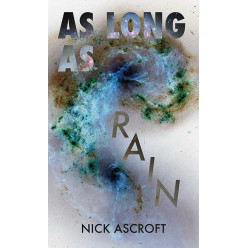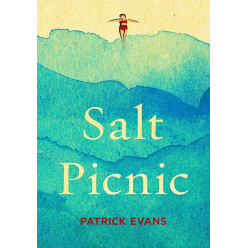And the Juice of a Lemon
Immediate Download
Download this title immediately after purchase, and start reading straight away!
View Our Latest Ebooks
Explore our latest ebooks, catering to a wide range of reading tastes.
From: And the Juice of a Lemon, by Bill Lennox
Chapter Two
Shale took the manila folder from the shelf above his desk and started on Nelson’s printed pages.
Lanks was Here
Chapter One - to get a few things clear
Now I don't want you to start off confused. You might be confused enough by the time I finish telling you about the things that have happened in the last few months without starting off confused.
So this is the situation, the set-up as they say in American movies. (If you think this is an American movie, then you're already confused. Stop reading and go to a movie.)
The situation: I'm writing this in longhand as they say (although my hands are quite stubby) in this old 2F exercise book. It has the first eight pages torn out because I started using it as a composition book and wrote only two stories in it. If this story ends suddenly, that means the last eight pages have dropped out too. You know how it goes.
This could be easy or impossible. Should he cut some of the teen-babble and get into the action, or would there be nothing left? And who is this story for? He didn’t get a sense of audience.
He wished he'd asked Nelson these questions on the phone but knew there wouldn't have been answers. Anyway, he ought to read the whole story before reaching conclusions. He’d think of himself as the audience for now, because he was.
Anyway, in this old composition book I'm going to tell you (whoever you are) about what happened in the last few months. Don't ask me why. Thought you might be interested, that's all.
No, the reason is that what happened in the last few months is a bit odd and strange and I don't want to forget any of it. So I'm writing it down as if it was a story in a book and when I've finished it I'm going to put the exercise book away and not look at it for ages. I don't really want to think about it. OK so you think that sounds pretty odd and strange. It is.
This wasn't semi-literate stuff. Maybe he could get away with doing nothing much to it and just whip up an ending. When Nelson agreed to three months he’d might have imagined a major rewrite. But he’d said not to change the gist of the story. It was a ridiculous amount of time for a simple editing job. Shale started to imagine serious profits. If Nelson had mailed the cheque. And if it didn't bounce.
There were paragraphs about becoming rich and famous and about high school. Shale penciled notes in the margin beside possible cuts. He estimated it was set in the fifties, maybe late fifties.
So there you are. I can start the story now. If you finish it and think it wasn't so great, just imagine if you had been involved in it. And if you have been involved in something like this you ought to know why I feel like writing it all down. In chapter two the story really gets cracking.
It didn't. There was an incident at a dam the narrator and two friends had been building on a creek. That provided an introduction to ‘the Harley Block kids’, a juvenile, apparently infamous but harmless would-be gang from a new state housing area.
They'd scream around the countryside like mad dogs at a cat's picnic (I might go back and change that "mad" later - you’ll see why).
The narrator was heavy on ominous asides.
Chapter three opened with an introduction to what seemed like the point of the story, an adult called Lancelot Kroon.
We knew it was Lancelot Kroon because no-one else could have been riding uphill through the manuka along the clay track right on the edge of the creek at about the speed of a sputnik rocket without making a ghost of a sound.
It turned out that Lancelot, known as Lanks, rescued the boys from the persecution of the Harley Block kids simply by turning up.
It was probably because of this typical silent entry that Lanks straight away had the Harley Block types on the back foot. Actually one of them had his back foot, still in his school shoes, right in the creek. That's the sort of effect Lanks had on them. Transfixed.
I thought the spell would be shattered as soon as Lanks opened his mouth. Apart from everything else, he has this giggle. It's sort of like a preface to everything he says. It's just the Ha Ha variety but it's always just that. Two Ha's, very high pitched and they run into the word that comes next.
"Hahagidday you jokers, what's up then?"
Not exactly a line from John Wayne (Ok you guys Ah'll give ya ten secunds ta make dust) or even Biggles (By jove Ginger we've stumbled upon some rascals asking for a thorough walloping) but it did the trick.
The Harley Block kids retreat, with taunts from a safe distance.
"Have to get a crank on your side!"
"Kroon the loon!"
"Lank the crank and all the little crank handles!"
"Let's piss in the water upstream!"
The narrator's friend, Bryan, labels them "Hundred-yard heroes". That was good. Shale skimmed to a fuller description of Lanks.
I called Lancelot Kroon an adult back there but that would be debatable. They say he's getting on for 40. He's tall and spindly with blonde hair which is as soft and unruly as a baby's. But he is also practically bald. Like my uncle, he is totally bald on top with short hair on one side and across the back, and great long strands of wispy hair stretched across from one side of the bald patch to the other. Why don't they just admit they are bald?
Even though he often scares kids off in the way I've just described, Lanks is gentle. As his hair suggests, he’s like a baby in many ways. He has soft pink skin and his voice seems never to have broken. He doesn't even need to shave. He seems to have hardly any muscles in his arms and legs (although he sure can ride a bike) and is he nervous! Meek would be the word.
He lives in the oldest part of Pakira in a square cottage behind a prickly hawthorn hedge. The section was chopped up long ago for more sections and right up close to the cottage on three sides is this huge billowy macrocarpa hedge. We have them all over the place here. They are about fifteen feet tall and ten feet thick which makes them great for making huts in. (I won't tell you what else goes on in them in case mum finds this exercise book.)
They seem to protect the Kroons. Like a row of cushions all around and with the row of thorns in the front. It's just what they need.
Lancelot lives there with his mother. (I could say "lived" but I don't want to think about that just now.) She's about half his height but has the same build. She must be about 90. She hardly ever goes anywhere but whenever we see her, like on a bottle drive or something, she always seemed as pleased as punch. But she always gave us the same answer.
"I'll have to wait until Lancelot comes home."
Shale had noticed the inconsistent tenses and thought that might be a place to start editing. Now he wasn't sure.
It seems strange that an old lady should have to depend on a bloke like that. Lancelot has always been - what's a polite word? People called him a crank, loony, a bit soft. Mum and dad never mentioned him.
Lance worked a normal day but we think he didn't get an adult's wages. He'd go off in the same bus every morning and be as pleased as anything if people spoke to him. He'd nod, do his laugh, then scuttle off a bit faster with that smooth sliding walk he does. He worked in a shoe factory and we'd see him every night, this six-footer with steps the length of an infant, gliding down the street with his pink painted lunch tin with the leather handle.
If you couldn't see his feet you'd swear he was on roller skates. Until he passed you, that is. He'd always step off the footpath, without breaking his tiny stride, and take a few steps in the gutter to let you pass. Even if you were a little kid. That's the sort of person Lancelot Kroon was. Considerate. Harmless.
Another chapter ended. Shale left the folder open, took an apple from the bowl on his desk, closed the door of his shopfront office and crossed the road.
From the stone wall directly opposite he could look back at Wordbusters. This spot on the stone wall was away from his work but not so far away that work was out of his mind. Not so far away that his own stories surfaced.
The cathedral was behind him and the sun full in his face. The stone wall was warm by mid morning.
Wordbusters was in a building the size of a double garage. It opened onto the footpath and gave the appearance of a regular shopfront, except that it was in the front yard of a two-storeyed brick and stone house. Shale leased it from the developers who owned the row of old houses, now used as offices and leased to lawyers, an architect, travel agents, a podiatrist and an old woman who sold curios and antiques. Shale visited her and bought cheap ornaments, mostly birds. He’d never tried to explain that.
Shale's office was probably built as a garage in the days when the houses were homes for the well-to-do who could afford cars.
There were signs that the building had been used at various times as a shop, a medical surgery, the headquarters of a protest against the removal of the oaks that Shale now sat under and, probably illegally, as a flat. Now it was technically commercial space but Shale, probably illegally, slept there. Lived there.
The doctor's examination and washup rooms remained and Shale had bought a caravan hotplate and grill from the secondhand shop. He ate erratically but a lot, and often out, usually at Cann’s.
Over two years Shale had pieced together a small but steady income. By accepting every offer of work, he lived well enough. He hadn’t bought any books or clothes during that time and hardly left the area, but that was fine.
He found himself writing for new Chinese immigrants, reading for closet illiterates, doing homework assignments for rich kids while they were off skiing, and handwriting romantic correspondence for a woman whose motives he was too needy to question.
No-one was turned away. Most of them were local so Shale spent much of his time walking around town delivering and collecting work. Apart from Cann most of the people he spoke to were his customers.
Every customer had a story that might have made great fiction if Shale felt inclined to get started on that novel, but he’d invented a business ethic that embargoed every idea for years.
He hadn’t decided how many years. That would be planning a future. It would be obvious when the time came. In any case, some of the work depended on a reputation for discretion. Shale found this easy. He spent his days in glancing contact with people. There wasn’t a lot of opportunity for gossip.
Shale finished the apple, took the core to the rubbish bin at the kerb and looked back at the cathedral extensions. He was interested to see how crudely the steel and glass addition would tie in with the brick structure built fifty years ago. The local controversy bored him as much as the similar one years before when the hundred year old church had been transported across the road to make way for apartments. He’d done some surveying work on that project but it seemed part of another life. Because it was. Now the old wooden church nudged up to the brick which was about to be leant on by steel and glass. Shale liked that.
He was uneasy about determinations to preserve at all costs. Lacquered snapshots in history, he called it. He wouldn't have thought so a few years back. Now the incomplete cathedral pleased him. Even when the nave extensions were finished the building would never, in a sense, be complete.
The homeless guy in the yellow hard hat walked past. He’d be on his way to the corner shop to buy a can of baked beans. Then he’d open them in the band rotunda in the domain and eat them out of the can with a plastic spoon he kept in his yellow gumboots. That was the sort of forward planning Shale liked.
Shale was thinking again of Aunty Cren. Her life had reached a new sort of completion for him, if that’s possible. A month ago a young woman had sat beside him at Cann’s and introduced herself as Aden, a cousin he didn't know he had - a daughter of Aunty Cren.
Until then Aunty Cren had been considered childless, occasionally on the dole, her life alternating between commercial kitchens and boarding houses. Her sisters agreed that Cren was a great cook but disagreed over which vice was her downfall. Not only was Cren one for the bottle, she was also one for the men and she just couldn't resist a flutter on the horses. Or was she actually a bit touched?
Shale knew about only her last few jobs but the scenarios seemed perfect - she'd worked in a restaurant at a racecourse, one of the city's last seedy hotels and a boys' boarding school.
Cren's life had ended a year ago in a top floor room of a Mount Eden boarding house of the kind she'd lived in most of her life. A man called Edgar had been with her.
There always was a man. The sisters had long accepted that Cren needed a man around and had stopped worrying about whether she was being taken advantage of, taken for a ride.
Shale had been told that Cren was ‘generous to a fault’, an expression that still puzzled him. It was used by aunts who talked about any generosity as if it were a fault.
As a teenager Shale thought Cren's life had a nicely rounded simplicity. She’d worked hard, owned little, had a hard life but a good time. He saw the same in her death. But the appearance of Aden called for a rethink.
The man called Edgar managed to time the sale of the last of Cren's clothes for the day of her death. The next day he sold the last of her Hank Williams and Jimmy Rogers LPs, so Cren went out as she'd come in, as they say.
Except, as it later turned out, for Aden. Shale wondered about the bits of Cren's life that even his mother, Cren's sister, knew nothing of - or didn’t mention. That generation preferred things to be like their living rooms - simple and tidy, or at least simple. Everything tidied away.
Long before her death the family wrote Cren out of their lives. Shale toyed with the notion that he was writing her back into his. That night he made a start.







